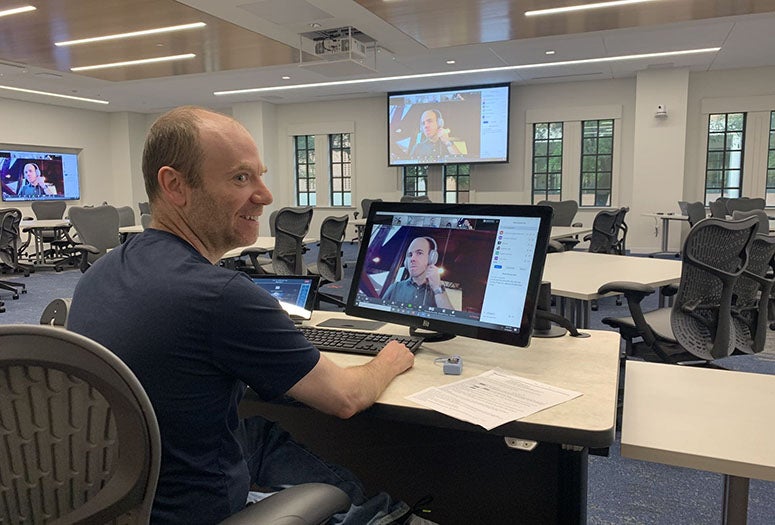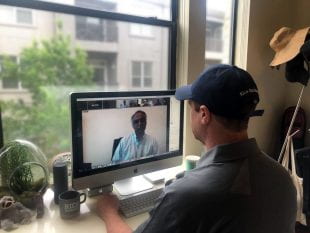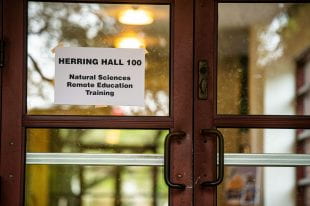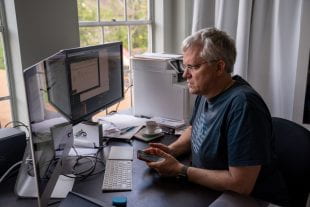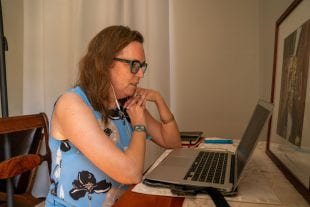If there was ever a time for the Rice University community to step up, that time is certainly now. From the evidence to date, it seems it is.
Rice students, faculty and staff are finishing the spring semester in unprecedented circumstances, responding to the threat of COVID-19 by hunkering down and delivering classes online.
Within a matter of days, faculty modified their courses to remote instruction, figuring out how to deliver quality higher education while sitting in front of computer screens instead of standing in front of lecture halls.
From the logistical challenges involved in delivering lectures and labs remotely to adjusting course content for the radically altered world students are now navigating, instructors and the staff supporting them are finding creative ways to continue meeting the university's high standards for the classroom experience.
Many of them are sharing their stories, and some of their best practices, with Rice News. As electrical and computer engineer Ray Simar said after reconfiguring his class, “We could turn it into a miniseries. It has more storylines than 'Game of Thrones.'"
Many classrooms are moving to Zoom for live instruction. Daniel Domingues, an assistant professor of history, found his Africa in the Museum course disrupted with the abrupt end of FotoFest, but found a way to integrate the course’s existing Canvas page with Zoom. “We’re going to try to continue our meetings online," he said. "I say 'try' because my wife and I live with a 3-year-old in a tiny apartment and the little one isn’t very cooperative.”
Chemist László Kürti declared himself ready as well, and added a twist. “I have now practiced sharing the notepad feature of iPad where I can use the Apple Pencil and draw chemical structures and interact with the students,” he said.
English professor Joe Campana noted a benefit of teaching adults in his Glasscock School master’s course, Exploring the Arts, is that many already use Zoom at work. He said one student who manages Zoom calls at her workplace quickly wrote a handy guide. "We got really lucky," he said. "We're a small group, so that helps, and we'd already bonded in a number of different ways weeks ago, and that's partly because we went to live performances together."
Economic chair George Zodrow called in the cavalry to get classes up and running online, putting faculty members Jimmy DeNicco and Mahmoud El-Gamal in charge of the Social Sciences Transition Resource Team. “Jimmy has a great deal of experience with the online teaching of our Principles of Economics course and Mahmoud, who is our director of undergraduate studies, is also one of our more tech-savvy faculty members," Zodrow said. "Mahmoud recently was able to benefit from the extraordinary support of Rice IT to get some specialized software made available to students in a matter of a few hours."
Sports medicine lecturer Laura Kabiri learned something about herself as she organized her material for Zoom. "Immediately upon hearing that we should prepare for remote course delivery, I started recording my lectures to post online,” she said. “Unfortunately, I found myself falling asleep during my own lectures.
“No one plans for this,” Kabiri noted, “but I know Rice will analyze, improve and revolutionize the way educators and students make lemonade out of all these lemons.”
One course seemingly meant for the times, Monster by Deborah Harter and Mike Gustin, explores what humans find monstrous from a scientific and literary perspective. It took a different turn with the recognition of parallels between the course and the current crisis.
"Students come into our class thinking that the course is about vampires and Dracula and all of that,” Harter said. “And what they are often surprised to discover is that that we're interested often in those monstrosities that are not so visible, that are in fact invisible. And that is what makes, I think, the coronavirus so frightening.”
Jones School professor Jing Zhou, who teaches graduate-level management and psychology, said detailed preparation several weeks ago has paid off in a smooth transition online for her working professional students. She’s going solo in a Jones classroom set up for remote teaching.
“I like to walk around and write things on a board, and teaching in a real classroom allowed me to hold some things constant amongst a sea of change,” she said. "I was pleasantly surprised that teaching went really well. The 60 students stayed engaged throughout the two days. … Occasionally, the students’ toddlers, dogs and cats popped in our class, bringing a smile to our faces."
Robert Yekovich, dean of the Shepherd School of Music, noted online learning holds particular challenges for Shepherd students, given the importance of ensemble participation.
"Having to take these actions is extremely disappointing for everyone, yet we do so knowing these measures are necessary and in the near-term interests of our school community," he said. But students and teachers are working together to fulfill their commitments. “We are committed to insuring that students scheduled to graduate are not obstructed by these unfortunate setbacks.”
Jones Professor Scott Sonenshein has particular expertise in adapting to circumstances.
"As someone who has literally written the book on resourcefulness, I put into action what I've spent much of my career researching,” he said of his Leadership Intensive Learning experience course. “With only a few short days to get my class online, I transitioned it with minimal disruption and took advantage of the online platform to do things I never had thought about in the classroom environment.”
The School of Social Sciences’ Rachel Kimbro actually found herself ahead of the curve with her Medical Sociology class, thinking not only about what could happen but also how it could and should be recorded for history.
"About a month ago, by student request, I jettisoned a planned class day and lectured on the coronavirus,” she said, noting that little of record remained from Rice’s experience with the 1918 flu pandemic. “I determined that we would create contemporaneous records of student experiences (and mine), influenced by course material, and contribute them at the end of the term to the Woodson Research Library and Rice’s archives, with the support of (University Historian) Melissa Kean.
“So far, the entries are wonderful — full of wistfulness about leaving Rice and concern for others.”

